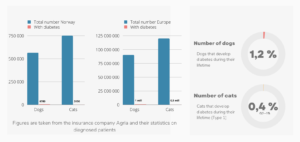Lifecare Veterinary
Lifecare Veterinary is a subsidiary of Lifecare which takes the sencell technology and adapts it to the veterinary market. The mission is to deliver a new and better glucose monitoring system for animals such as dogs and cats.
The aim is to launch a final product to the animal/veterinary market, collaborating with industrial partner(s), in 2024.
Innovating today for a healthier tomorrow
Our focus is to help animals with diabetes live healthier, happier lives. That’s why we’re dedicated to developing life-changing technology that will provide glucose readings faster, and with less inconvenience.
Lifecare Veterinary use the Sencell technology which incorporates a 3D printed nano-sensor and is implanted under a animal’s skin. Sencell continuously measures the osmotic pressure in the inner sensor chamber which is directly correlated to a animal’s glucose levels. Sencell lasts a minimum of six months and measures an animal’s glucose levels in real time. The data are transferred wirelessly to owner’s smart device (smart phone or smart watch), allowing the user to control their animals glucose levels.
The Sencell glucose monitoring system includes an osmotic pressure sensor (sensor core), transmitter (sensor electronics) and a mobile medical application (reader) to continuously measure glucose in the interstitial fluid.
Market potensial
The global pet diabetes care devices market was valued at $1.9 billion in 2021, and is projected to reach $3.5 billion by 2031, growing at a CAGR of 6.3% from 2022 to 2031.
Diabetes is more common in older pets. Dogs and cats with diabetes usually require lifelong treatment with special diets, a good fitness regimen, monitoring and daily insulin injections.

Innovating today for a healthier tomorrow
Our focus is to help animals with diabetes live healthier, happier lives. That’s why we’re dedicated to developing life-changing technology that will provide glucose readings faster, and with less inconvenience.
“When there isn’t enough insulin, the cells of the body become starved for their primary source of energy – glucose.”
“Dogs & Cats with diabetes mellitus require daily insulin injections and monitoring.”

